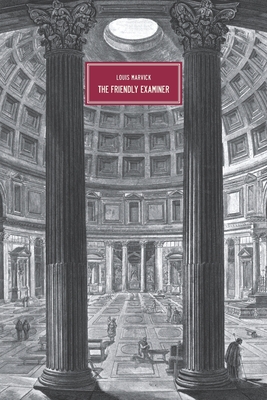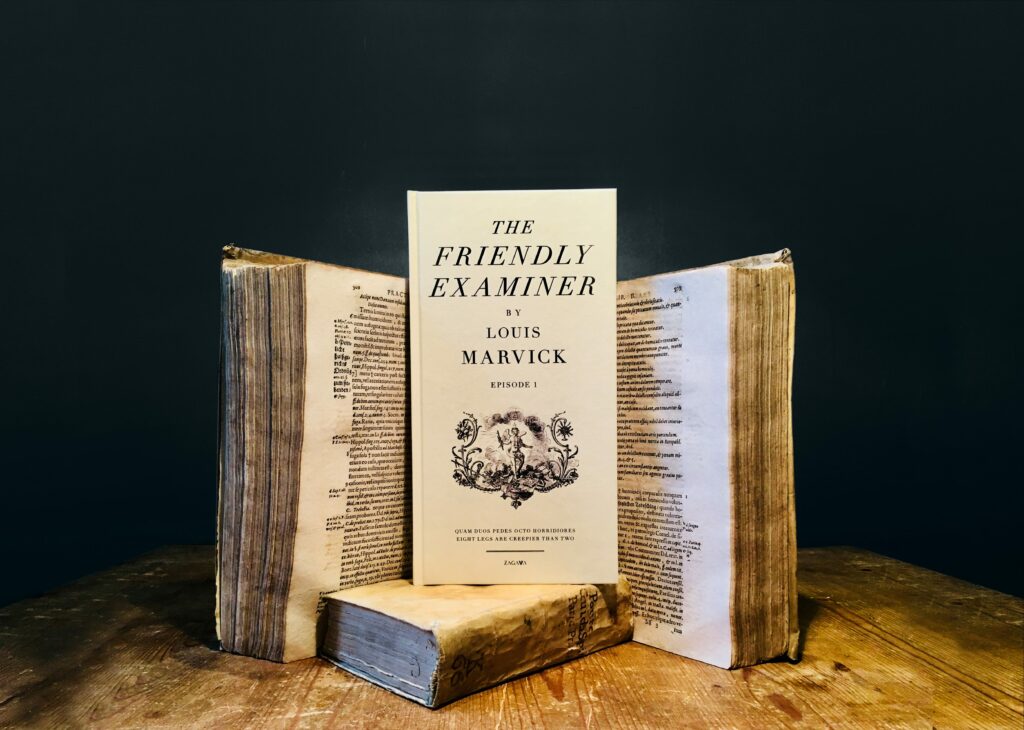 I first encountered the name of Louis Marvick here on Nighttrain. In the IF Weird-magazine, which has unfortunately fallen somewhat into oblivion, there was (and is) not only the first German translation of a Marvick text, but also an overview of his work. This is owed to Martin Ruf, who took on the difficult task of translating Marvick and at the same time presented an essay on Marvick‘s works.
I first encountered the name of Louis Marvick here on Nighttrain. In the IF Weird-magazine, which has unfortunately fallen somewhat into oblivion, there was (and is) not only the first German translation of a Marvick text, but also an overview of his work. This is owed to Martin Ruf, who took on the difficult task of translating Marvick and at the same time presented an essay on Marvick‘s works.
It is no secret that I share the tastes of the friends at White- and Nighttrain (otherwise I wouldn’t be writing in its blog). However, Marvick’s text has left a lasting impression on my mind. I was simply impressed by his fluency and the intellectually tinged themes.
The same goes for his Connoisseur der Trauer , also translated by Ruf and published in the Whitetrain Collective’s Chapbook series.
Whitetrain is not alone in its enthusiasm for Marvick in the German-speaking area. Jonas Plöger publishes Marvick’s texts in „his“ publishing house Zagava. Although based in Düsseldorf, Zagava offers its exquisite programme exclusively in English. This is not only because sophisticated literature can only be translated with some compromises, but also because the market for German-language Weird Fiction is simply too small. If you are serious about Weird Fiction, there is no getting around the English language. Consequently, Zagava addresses a connoisseur audience. Exclusively in printed form, the small publishing house offers a select programme for a bibliophile target group. This target group is certainly willing to pay a little more for high-quality literature in a high-quality setting.
For review purposes, the publisher kindly provided me with a digital version of The Friendly Examiner, which is available as three individual installments.
Welcome to France
Marvick situates his works in distinctive locations whose genius loci he incorporates into his work with great attention to detail. Frequently, the professor of French has chosen France as his setting. This time, his French expertise permeates the subject all the way through. He takes us right into the middle of the exciting period of the French Enlightenment around the Encyclopaedists. In doing so, he does not shy away from drawing on real, albeit fictionalised, historical figures. First and foremost Denis Diderot, who appears here as a friend and patron of our main character. But Jean Jacques Rousseau, Montesquieu or the strange LaMettrie also have their appearances.
One quickly notices Marvick’s expertise, who goes into the subtle debates of the encyclopaedists and even provides some central points with references to literature. Even if I disagree with the details – I simply have to defend the likeable bon vivant La Mettrie against a simplified materialist interpretation – you notice throughout that someone of expertise is writing here, someone who loves and penetrates the French Enlightenment to its very depths.
Comfortably grave
The Friendly Examiner is not an academic book, but a fantastic story. Marvick deliberately does not take historical facts too seriously and sends his protagonist on a search for rational explanations for irrational events in three stories. In the process, the very limits of rational explanation are explored while entertainment is not neglected. Despite the heavy subject matter and an equally demanding language, the play with these elements seems downright light. Marvick works with his characters and theories in a way that makes for an original, fantastic, sometimes even pulpy work. If you take the time to let Marvick’s words sink in, you are immersed in a fantastic variation on the 18th century French intellectual scene.
This means that you need to bring at least three things with you to fully enjoy the book. First, a basic interest in philosophy or intellectual history. If you don’t share this interest, you will miss many a punch line. Secondly, you need to have some quiet to immerse into the book. Even the „pulpy“ Marvick is not someone you just read, you have to let his texts sink in. His works are meant to have an effect on you and must be given space and time to unfold. Last but not least, the reader should be well acquainted with the English language. Despite a philosophical background and some experience with the English language, as a non-native speaker, hardly a page went by for me without a look in the (digital) dictionary. Like all authors, Marvick brings his own vocabulary. This time – quite appropriate to the topic – it is somewhat more complex than usual. With the necessary calm and willingness to accept the challenge, the book is also accessible to non-native speakers, but it is quite demanding.
The Stories
 I always have a hard time with synopses, not least because I usually read books that excel in atmosphere and theoretical considerations. This is also true of Marvick.
I always have a hard time with synopses, not least because I usually read books that excel in atmosphere and theoretical considerations. This is also true of Marvick.
Here we read – as I said – three short stories, each tracing a mystery that wants to be rationalistically solved. The first story is set in Swabia and thrives on a strong female figure and a natural feminism. Here, Marvick effortlessly weaves philosophical questions of principle and an examination of religion into the search for an explanation of a local legend.
The second story is also captivating in its blending of adventure and intellectual history. This time it is about the fascination with ‚black novels‘ or the ‚graveyard school‘, which cultivates a cult of death and decay as a kind of romanticist reaction to rationalism. Finally, the third loosely connected part takes us across the sea. Here, among other things, (post-)colonial thoughts are interwoven with the view of the ‚foreign‘ at that time. However, I am not sure whether Marvick occasionally falls into problematic stereotypes that reach beyond the mere narrative perspective and are thus reproduced.
Conclusion
It should have become clear that Marvick’s The Friendly Examiner is not a book for all tastes. Despite pulp elements, it challenges the reader intellectually. Marvick deserves credit for the fact that he succeeds in doing so in a thoroughly entertaining manner. With The Examiner, he presents not only perhaps the only fantastic narrative about the French Enlightenment, but also a work that is as entertaining as it is profound.
Marvick is not an author for everyone, but anyone who enjoys Weird Fiction in the deeper sense should definitely keep an eye on him and his books. Not least because the limited collector’s editions often sell out far too quickly. Sapere Aude!
Bibliographic Details:
Marvick, Louis (2021): The Friendly Examiner. Düsseldorf: Zagava Books. (Purchase directly from the publisher)
Further Reading:
- Interview on the book with Louis Marvick, conducted by Martin Ruf: https://www.zagava.de/authors/detail/articles/authors-detail/louis-marvick


